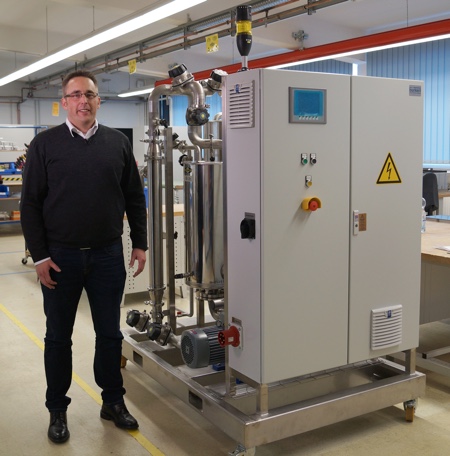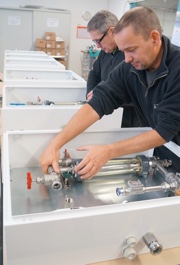Process control systems in almost every industry are becoming more complex; they are subject to greater scrutiny due in part to the demand for improved efficiency, regulatory compliance and higher levels of automation and plant integration. The need for bespoke or low volume system design is also growing as a result. Bürkert has addressed this challenge by developing the Systemhaus approach, where regional technology solutions centres sit between the sales offices and larger-scale manufacturing facilities, solving problems and building innovative systems on-demand.
'The market for small volume, specifically tasked control systems is certainly growing and the operational environments in which this equipment is working are complex and governed by a considerable amount of legislation such as ATEX or food and pharmaceutical safety and cleanliness standards for example,' explains Neil Saunders, UK General Manager for Bürkert. 'End users realise that transferring the responsibility of meeting these demands to a trusted supplier can reduce costs and increase operational efficiencies.
'The diversity of requirements and the global appetite for these systems means that manufacturers need to take a new approach to meet demand. Bürkert manufactures more than 100,000 different products, for example – typically valves, actuators, sensors, controllers and combined devices. Applying these products to scenarios that require specialist assemblies requires skill and experience as well as an imaginative approach, but without the volume constraints of large-scale production runs. This is where we use our Systemhaus network.'
The definition of a bespoke control system means that the designers have to start from the ground up, working closely with the client to establish what will be delivered by the new system and how best to achieve it. Often existing technology and components will have to be integrated with unique parts and custom designs to achieve the best solution.
The principle of outsourcing this type of project is considered by the vast majority of OEMs as an essential part of manufacturing strategy that allows them to remain competitive in a rapidly changing global market. In practical terms this strategy can deliver a number of improvements such as reducing supply chain management costs while improving production agility and the use of internal resources.

Jens Fuhrmann, General Manager Systemhaus Dortmund
Jens Fuhrmann, General Manager at Bürkert’s Dortmund Systemhaus, comments: 'Modern process control systems can encompass a huge range of parameters, deliver micron levels of accuracy and repeat millions of cycles, all the while recording data for standards compliance or historic analysis. However, designing, building and delivering a new process control system requires considerable expertise and flexibility, as well as an in-depth knowledge of the industry standards and specifications.
'The most effective way of delivering a bespoke project is to assign a team that contains all the necessary skills and expertise to design, simulate, prototype, construct and test the finished product. Working closely with the client, this team has the ability to ensure the most efficient methods are used to develop an idea into the completed design.
'These teams can procure all the necessary components, both from our own product lines and from external suppliers to achieve the most effective solution for the client. At the same time all the components must be seamlessly integrated and work together to deliver the required control structure and meet the necessary industry standards.'
Each industrial sector has its own requirements and these must be adhered to if any new product is to be accepted under the current certification scheme. There are statutory requirements of HACCP (Hazard Analysis and Critical Control Points) for the food processing industry that set very precise standards with regards to cleanliness, safety and product quality. These standards are aimed to protect the consumer and they are enforced rigorously in most countries by regulation.
Industries that are required to adhere to stringent hygiene regulations need process control systems that will seamlessly integrate into the existing, predominantly stainless steel process structure. Bürkert ensures that all pipework associated with a design is fabricated and welded by engineers that are ASME (American Society of Mechanical Engineers) coded for process piping.

Panel assembly at Systemhaus Dortmund
Similarly, components and systems operating in potentially explosive atmospheres must be suitably tested and certified as safe for such an environment using the ATEX and IECEx standards. This is an area that requires considerable expertise and design knowledge to deliver a packaged solution, typically on a skid or in a cabinet that is tested and guaranteed to operate safely once installed.
'The benefits of collaborating with an industry leader that has the resources and expertise to deliver bespoke or short run projects should not be underestimated,' concludes Saunders. 'The potential to reduce manufacturing lead times and costs as well as providing a guaranteed fixed cost of ownership allows a client to concentrate on their core business and improve their own productivity.
'The depth of knowledge and experience within Bürkert ensures that the finished solution will fully satisfy the client’s expectations. The completely in-house build programme will ensure that all the necessary components, including HMIs, PLCs and their programming will be integrated and ready to connect with the host system. We continue to support all our customers with their own projects; however, sometimes you need the scope and resource of an original equipment manufacturer to deliver. The fact that we are using our Systemhaus resources more and more in the UK just serves to underline the fact that the market has changed and will continue to do so.'

